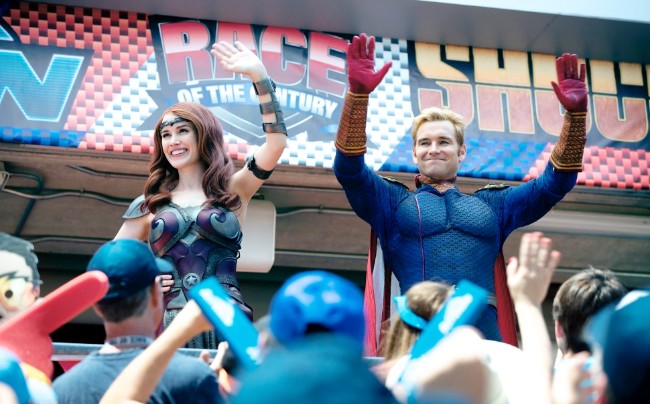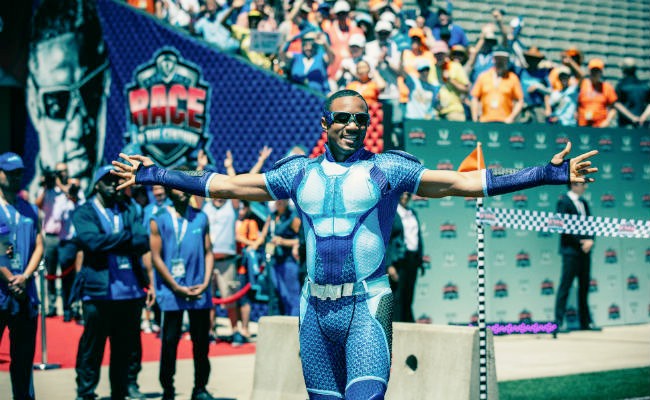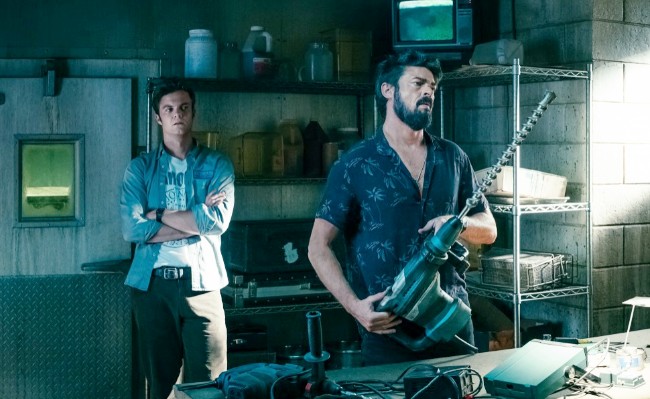
There are two sides to Eric Kripke’s The Boys. On the one hand, the TV adaptation of one of Garth Ennis’ most beloved comics dives into the consequences of superheroes (or “supes,” as they’re known on the show) fusing together the worlds of politics and celebrity. These superpowered beings are, on the surface, flawed individuals more concerned with money, fame, and the status of their brand than saving the world. On the other hand, though, Kripke admits he’s spent a lot of time figuring out the logistics of shooting dolphins from t-shirt cannons and framing oral sex scenes that end in carnage.
So yeah, confining this show to an easily identifiable box is not easy. And that’s the point, at least for Kripke, who cut his teeth on genre faves like Supernatural before switching to the story of a rag-tag group of regular joes out to deal some street justice to the world’s god-like heroes. We chatted with Kripke about his show’s roots in the real world, his love for superheroes, and why it was only a matter of time before The Boys took them down.
The Boys is a favorite of Garth’s, so how did you convince him to give you the reigns to this one?
I took a meeting with a friend of mine who works for Neil Moritz (Preacher) just to say to him, “Hey man, f*ck you for giving Preacher to somebody else,” because I’m the world’s biggest Garth Ennis fan and he was like, “Well, we’re about to get The Boys. You want The Boys?” That was it. Then I had dinner with Garth because it was important to me to get his blessing. He asked me, “What’s your approach on this?” I think he was feeling me out a little bit. I said, ‘Well, actually, I think between Butcher and Hughie and Frenchy and Female and Hughie and Starlight, I actually think it’s a really sweet little story.” He took a beat, and he was like, “Yeah, I think so too. Why doesn’t anyone see that?”
It’s crazy to ask this but were you ever worried about this show feeling almost too realistic?
Every so often I get a note, like, “Are we in too much hot water with what we’re commenting on?” Look, you don’t want to comment on it word for word, because I think that’s boring. You don’t want to be so ripped from today’s headlines that it’s like some Menendez Brothers TV movie. No. That’s not where we want to be. But I’ll tell you, good genre is a metaphor, and what I love about this show is you can take any issue, from racism to class struggles to politics to #MeToo, and you can really talk about it. And it doesn’t feel too close because there are people with capes and lasers flying around. Going back to Rod Serling and Gene Roddenberry then moving forward to Joss Whedon, those are the people that I admire. Those are the people who use genre to comment on our world. It’s definitively a superhero show. There are superheroes flying around, but I’m using that world to really reflect on ours, and I think that’s what Garth created. I think he was amazingly prescient, almost psychic, about the world we live in now.

I’m not convinced he isn’t actually clairvoyant.
That first dinner, I asked, “What inspired you to write The Boys?” He said, “I was really inspired by what would happen when you combine the worst of politics with the worst of celebrities.” That was 2006, man. Here we are in 2019, and we have a reality star as our president, and with social media, the line between celebrity and politics and power and manipulation has never been blurrier. Those were the issues Garth was interested in 15 years ago. It’s definitely a show whose time has come.
A good thing for you and Garth, but maybe not for the rest of us.
Yeah, I don’t think that’s necessarily good for the world, that the show so accurately reflects what’s going on. Our saying in the writer’s room is, “Bad for the world, good for the show.” I’d rather the world not be like this. I’d rather the world not so accurately reflect an insane Garth Ennis comic, but here we are.
On that note, there’s a bunch of crazy sh*t that goes down on this show. Was there a scene you filmed that you thought, “Man, I can’t believe we get to do this on TV?”
Yeah, there’s two scenes and both happen to be in episode four, which I think wins the award for the craziest episode. Without getting into too much detail, the Deep tries to kidnap a dolphin from a waterpark, and he’s in a car chase with a dolphin in the back of his van. I won’t give everything away, but I’ll say that we had to present to production the most effective way to launch a dolphin through a windshield. There’s a whole special effects department that’s like, “Okay, here’s what we’re going to do. We’re going to create a canon, and it’s going to be kind of like a T-shirt cannon, but the circumference of a dolphin. Then we’re going to put in a green dolphin that we’re going to launch through the windshield, that then the visual effects guys are going to paint and animate as a real dolphin.” They just present you this whole, “How do we launch a dolphin through a windshield plan?” And you’re just like, “I get paid to do this.” The other one is the one you saw [in the trailer] of the face-sitting scene, that smashed the guy’s skull. That was a hilarious series of conversations, too. The special effects guys are like, “Okay, we’re going to build a prosthetic head, but when it’s the actor, we’re going to have to build a saddle because it’s illegal for her to sit on his face.”
Makes sense.
Yeah, it’s like, “Good point, good point. We’ll build the saddle.”

The violence is just a by-product though of this revenge arc that the main characters, Hughie (Jack Quaid) and Butcher (Karl Urban) find themselves on. Was it important to you to show the consequences of being so fueled by hate and vengeance, like Butcher and Hughie are?
Hughie’s on a revenge arc, but revenge and violence do not come easily to him. The way we put it in our room is, he’s got Butcher as the devil on one shoulder, and he’s got Starlight as the angel on the other. He’s torn between both, because on one hand he’s never gotten to be macho and strong and empowered, and Butcher gives him all that. It’s invigorating. It’s an adrenaline rush. He’s able to finally fight back, and there is a wish-fulfillment in that. But when you see the whole season, you’ll see that it’s toxic too. It’s a disease. Revenge will ultimately do more damage to the person seeking it, and it will kill you. He needs to choose love and loyalty and the people around him over the single-minded vengeance that in many ways Butcher represents. For me, the best piece of pop culture that was about revenge period was Unforgiven. I’m majorly inspired by that movie. Yes, it’s a revenge movie, but it really talks about how toxic and dangerous violence is and how this myth of masculinity, which a lot of people are starting to talk about, like really f*cks you up. It’s dangerous. You’re not allowed to be an individual. You have to fall into this archetypal role of what macho is supposed to be. I think that’s something that Hughie and Butcher both struggle with this year.
We’re getting pretty deep for a show that shoots dolphins out of t-shirt cannons here.
Look, all this psychology, it’s all underneath an incredible amount of comedy and sex and violence. Just to be clear — this show is mostly blood and nudity, but there’s a lot of peanut butter around that little pill.
Do you think this show mirrors the feeling of superhero burnout everyone’s talking about right now?
It’s hard to say that we’re in a period of superhero burnout when Avengers makes $2 billion, but I do think that we’re reaching an interesting stage where people are starting to analyze and deconstruct that myth, which is what I think we’re doing. For the record, I’m a fan of those movies. I like them without any cynicism. I’m in line for all those movies. But they speak to a myth that’s not particularly honest; that someone with that type of power would only be benevolent. That’s just not true. I think there is something quietly dangerous about that myth. I think this idea that when you are in trouble, you need to wait for someone much stronger than you to come in and save you in some grand fashion is how you end up with dictators and autocrats. I think what the superheroes say in the movies and I think what certain politicians say during their speeches are pretty f*cking similar in terms of, “We are going to come in and save you.” But that’s not how reality works. You get up, and in small, tiny ways, you quietly do the hard work to save yourself.
Amazon Studios’ ‘The Boys’ premieres on July 26.
